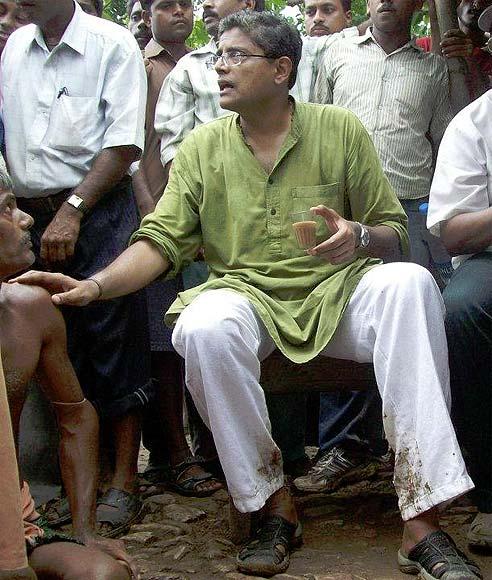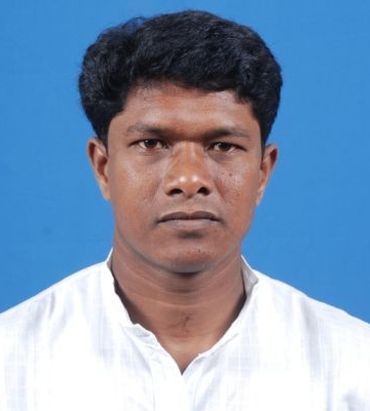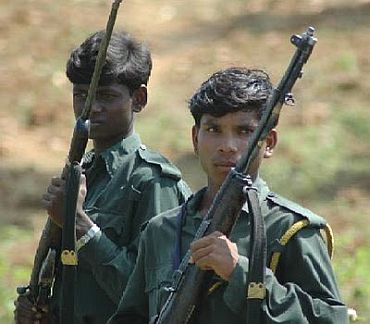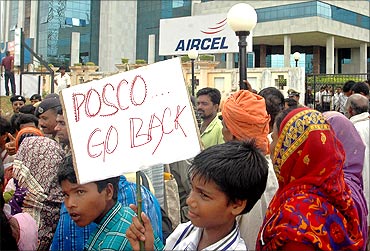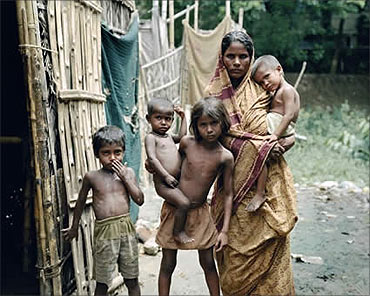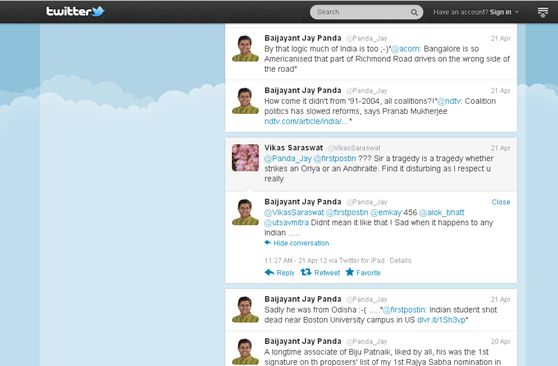 | « Back to article | Print this article |
Why Odisha negotiates with the Maoists
Bijayant 'Jay' Panda symbolises the young Indian politician who appears just as comfortable in Parliament as he is in Kendrapara, the rural Orissa parliamentary constituency from which he has been elected to the Lok Sabha.
Two terms in the Rajya Sabha (including one where he was his Biju Janata Dal party's leader in the Upper House of Parliament) were the training ground for this MIT graduate.
An evangelist for Odisha, he is seen regularly in television studios, defending the BJD government's anti-Maoist record at a time when its Chief Minister Naveen Patnaik is seen as soft on the outlawed extremists.
Panda tells Rediff.com's Savera R Someshwar why he believes Odisha has made significant progress in tackling the Maoist menace.
Do you feel that giving in to the Maoists' demands is in a way encouraging them?
Do you feel they are emboldened to continue on the path they are on because they know that ultimately the government is going to consider the lives of those who have been kidnapped and give in to their demands?
Let us look at this in the context of the two extremes.
There are States and there are philosophies which have a 'no negotiation' policy. One extreme example is Israel, which has an official 'no negotiation policy'. Yet, even States like that make exceptions.
We are familiar with the case last year when, to release one soldier Gilad Shalit, Israel released more than a thousand prisoners, including many with very serious charges against them.
Of course, this is not an ideal situation.
Any type of swap deal or a release of prisoners will be questioned by people in society, by the media, by policemen who have been involved in security actions...
But I think one has to look at it in a holistic manner.
Just like negotiating has consequences, not negotiating -- if harm were to come to some of these hostages -- would have all kinds of consequences including demoralisation, including some kind of victory for the Maoist agenda.
One has to treat this with extreme care. I don't want to take a hard and fast position on this at this time.
Please click NEXT to read more of the interview...
'MLA Hikaka has to be given time to settle down'
Biju Janata Dal MLA Jhina Hikaka was released by the Maoists after he gave them an undertaking that he would resign his assembly seat. What is your reaction?
We have only heard about this by way of rumours and media reports; there is no concrete evidence.
In any case, when you are in captivity, any undertaking that you give cannot be treated as if it is a free and unencumbered decision.
It is given under compulsion and should be treated as such.
He has just been released. This is not the time to press him on those issues.
It is important that he first re-integrate into normal life. He should spend time with his family and get back into his normal routine.
I am sure he must be under a lot of stress because of the time he spent in captivity (the MLA from Laxmipur, Odisha, was kidnapped by Maoists and spent 32 days as a hostage).
Time has to be allowed for him to settle down.
Once someone is released from custody, especially if he is an elected representative or a government official, what steps does the government take vis a vis that person?
The MLAs, collectors and other public representatives of Maoist-affected districts are given security cover to begin with. There are certain guidelines about commonsensical safety measures that they ought to take.
Other than that, I would assume there will be a security review.
In any case, Hikaka and other MLAs in tribal districts have been coordinating with the government for developmental work. That will go on.
Is there anything done on an individual basis to help them deal with what they have gone through?
He is being medically examined to make sure he hasn't become ill in any sense. There will be a security review for him personally because he has gone through this.
As far as Jhina Hikaka and his family are concerned, health and other measures are being reviewed.
Please click NEXT to read further...
'We have attractive packages for Maoists who want to surrender'
Once a hostage situation is resolved, is there any particular kind of action the government takes?
Yes, indeed.
In fact, on Friday (April 27), a senior Maoist woman leader surrendered in that vicinity. On Saturday (April 28), a security raid was conducted based on information that was received about an arms cache.
The government is also reviewing developmental steps. It's not like everything comes to a halt and nothing happens during when there is no hostage crisis.
I'll give you another example.
The Odisha government has taken a great deal of effort to give tribals the ownership of their land through land pattas.
If you look at our track record during the last two years, lakhs (hundreds of thousands) of tribals have got official pattas for their land so that they don't get exploited.
The review of tribal lands and their pattas, construction of roads and schools -- these are continuous processes.
And as far as interacting with the Maoists goes, the government has a stated policy. There is an attractive package for anybody who wishes to give up arms and enter into normal life.
There is an attractive package for those who wish to give information about Maoists.
Once a hostage situation is resolved, is there specific action that is taken in that particular area or you already have a plan in place to deal with the Maoist problem in the state and that is followed irrespective of what happens?
Both happen.
We see the demands the Maoists make in varying degrees of genuineness.
As you know, in our judicial system, even people with minor charges sometimes get stuck in jail for a long time because the court process takes so long.
One of the specific steps we are looking at, irrespective of the hostage situation, is how to expedite the court process so people with lesser charges against them can get their hearings early and get bail or whatever the court decides for them.
Despite the fact that the central government is cutting off the funding, the state government has, at its cost, decided to extend the tenure of the fast track courts in these tribal areas.
How is the BJD tackling the Maoist menace in the state?
If you look at the statistics -- and they are not our statistics, they are statistics by the central government and independent observers -- the number of such instances is actually coming down.
The peak was probably in 2008. If you compare the number of incidents, year by year over the last few years, you'll see that there is quite a significant decline of these incidents.
This has happened due to a variety of reasons.
The first is that much more developmental effort is going on. Roads, which have been held up for many years in these rural areas, are now being constructed; schools are being built.
The government's new programmes -- such as food security, rice at cheap prices to poor citizens -- are being closely monitored so that delivery is good.
There are other steps also. Security steps have been taken. The central government reserve forces have been increased; more infrastructure has been provided.
We believe this combination of security and developmental measures has led to the reduction in the number of violent incidents.
Please click NEXT to read further...
'Posco and Vedanta have not been held up because of Maoists'
You said the development in the state that has led to a reduction in the Maoist menace.
But two of the major projects in Odisha, Posco and Vedanta, are in a difficult situation right now.
Posco and Vedanta are projects that have had difficulties and have been held up due to a variety of reasons.
The Posco project is not in the Maoist area. The Vedanta project is in a tribal area where there have been some incidents nearby.
But I don't think either of these projects has been held up specifically because of Maoist activity.
My query is about the infrastructural impact on the state.
If you look at Odisha's economic performance -- which all these investments have a direct relation to -- there has had a dramatic change in the last decade.
Prior to say, 2000, Odisha's growth rate was abysmally low; in fact, it was much lower than the Indian average.
Even during the 1990s, when India's growth rate was in the 6 to 6.5 per cent range, Odisha was a fraction of that. But the interesting thing is that, in the last decade, Odisha's economic growth rate has been higher than the national average.
This is not just happening in Odisha. This is happening in Bihar and Chhattisgarh as well.
Backward states have started doing well so obviously there is some development happening. And it is not just happening because of minerals and mining or big projects which are in process industries.
If you look at the economic picture for Odisha today, you see significant investment from various sources -- IT companies are investing, hotels and tourism are participating in a much bigger way than before. There is a real estate boom. The economy is growing on many fronts.
At the same time, we have to recognise that a state that has been poor for centuries is going to take some time to turn around. Special measures are being taken to ensure that there is equity and fairness for those of our citizens who have been left behind -- the Adivasis and people who are below the poverty line.
In these two projects, it does look like it is the people themselves who are objecting.
In one (Vedanta), you have a court case where the judgment is pending. In the other (Posco), the state government is taking back the land allotted to the project.
I think you'll find that it is not just in these two cases... in many cases throughout the country the resistance of people on land acquisition is often not by a minority, but a vocal minority, of people.
If you look at, for example, the land acquisition matter on the Posco project, the number of people who are actually objecting on the ground are a few hundred people whereas the project is expected to directly benefit tens of thousands of people and indirectly benefit many, many more people.
So when you say that the people are objecting, you should actually qualify that by saying a few people are objecting.
Land acquisition is a complex subject. It is not just a problem in Odisha, it is a problem throughout the country and it has generated a lot of debate. The media has been writing about it. Social activists have been talking about it.
There is a draft law pending, which is supposed to come to Parliament. We need to act on it quickly so that there is a comprehensive, modern law in place to deal with land acquisition in a fair and equitable manner.
Posco's environmental clearance is in trouble. Odisha has appealed to the Supreme Court against the Centre's decision to withdraw the environment clearance granted to Vedanta.
I will not comment on a court case because it is sub judice.
As far as environmental clearances are concerned, it is a complex matter. If you look at what is happening, various arms of the central government seem to be at cross purposes.
If you are talking about the recent green tribunal order, it has acted against a clearance given by the central ministry which is responsible for these clearances.
States like Odisha seem to be caught in the crossfire between various arms of the central government.
When we spoke in 2009, you were very gung-ho about the Posco and Vedanta projects and you expected them to result in a lot of economic changes in the state.
You also had a strategy for land acquisition, including training programmes that would qualify those who had lost their land for jobs.
If I may quote you: 'We learnt that even if you have good policies, you cannot thrust them down people's throats. You have to cooperate with them, you have to convince them. So we took our time and did not bulldoze any project unlike in other parts of the country....'
'...Earlier, the emphasis was on paying the displaced people some money to take their land. Now, that money has been increased to reflect the market rate. They will also get jobs in the new project. And we try to ensure they have the necessary skills. For example, Posco is putting up a very large training centre so that the local people can acquire the skills necessary to get those jobs.'
I think my quotes are being taken out of context. I had said in general we have many projects, including these two projects.
You're right that these projects have been held up, but I have already addressed that issue.
The fact is, whatever I had said in 2009 in terms of Odisha doing better in terms of attracting investment has happened. It is not just these two projects.
We have already had approximately Rs 1 lakh crores (Rs 1 trillion) of investment already implemented on the ground. And that does not include these two projects. We have plans for many more investments.
I don't think I ever specifically said that our state's planning turns on these two projects. These are two big projects. And the fact is that, despite the delays in these two projects, Odisha has done very well indeed in terms of economic progress and in terms of investments coming into Odisha.
Please click NEXT to read further...
'We've seen quite a dramatic improvement in poverty reduction'
If you had to list the three biggest achievements of the Naveen Patnaik government in its present term, what would they be?
The biggest achievement we have had is that we have made very significant progress in the reduction of certain critically bad statistics we have had for decades.
For example, infant mortality and child malnutrition have dropped very sharply.
In both these areas, Odisha used to be much worse than the national average. Now, we have either come to the national average or very close to the national average.
In terms of poverty reduction also, we've seen quite a dramatic improvement. That's not to say we don't have poor people. We have a lot of poor people and we have a long way to go.
But the national statistics show that Odisha has made perhaps the most improvement among all the states within the last few years. This is what we have to show for the work we have done.
But we have a long way to go; a lot more needs to be done.
And if you had to list three areas where you have not achieved what you've hoped to... three areas where you have faced serious problems?
Well, obviously, we have not entirely removed poverty, but that is the case in most of India. Even though we have made the most strides, we still have a long way to go. That's number one.
Although we have made enormous progress in terms of getting big projects to Odisha, as you've yourself pointed out, there are projects that have been stuck. I don't know how much of the blame ought to be at the state level, but the fact is that these projects are stuck and often due to factors that are outside the control of the state.
We have made big strides in building roads and ports. We used to have only one port. Now we have three and several other ports are being developed.
But we need to build our infrastructure much more. Once infrastructure develops, it becomes easier to attract investment, much easier to create jobs.
Please click NEXT to read further...
'Any public personality must stay in touch with the people'
You're very active on the Internet. You are active on Facebook. You're active on Twitter. You're easily accessible. How important is this for a politician?
Increasingly so, even though it remains a fact that in more rural and agricultural constituencies like mine, most people still do not have Internet access. But that's the truth about India as a whole.
Hardly 1 per cent of Indians have Internet access compared to European or American countries where a majority of the people have access.
But I think that will change. It is already changing. There is a rapid uptake of Internet services.
Any public personality must always look for any avenue possible to connect to people, to get feedback from people, to get constructive criticism from people so as to shape our work, to address the real concerns of the people rather than any theoretical concerns.
At the same time, this is a medium where you get instant feedback. I was just checking your Twitter feed and you talked about the student who was murdered near the Boston campus. The way you worded it caused someone to 'correct' you...
Does the speed of the medium sometimes cause misunderstandings?
Of course, that's always possible. But one has to put everything in context.
Six people may misunderstand your intent and react to something... that does not mean everything you are doing is wrong.
With regard to the student from Boston who was killed... he was from Odisha. I think when I tweeted I said sadly he was from Odisha and some people responded and said it would have been sad wherever he was from India. And that's true.
What I meant to say is that it's a sad incident and that he was from Odisha. Grammatical mistakes can lead to misunderstandings; in this case, I clarified it immediately. But that is no reason to stop tweeting or stop interacting with people on the net.
You also conducted a crowd-sourcing experiment about the poverty line on Facebook. How did that work out?
I've read a bit about crowd-sourcing and the wisdom of the crowds as they say.
There was a lot of outrage when the poverty line was fixed at Rs 28 so I wanted to get people's feedback.
Crowd-sourcing is not only about taking experts' feedback. Some people said you should only take rural people's feedback. Or that you should only take poor people's feedback. That's not true. Crowd-sourcing is about taking a variety of feedback.
In fact, I got a lot of feedback on social media, both from my constituency which is rural, as well as from metro cities and from various parts of the country and abroad.
It was a very interesting experiment to get people to share what they thought was a level of expenditure which should be the minimum for an Indian individual or an Indian family.
As one of the younger politicians in Parliament, what kind of rapport do you share with Rahul Gandhi?
I've met Mr Gandhi a few times. He's from a different party; I'm from a different party.
Generally, all I have to say is that there is a generation change in Indian politics which is happening slowly.
For example, young politicians in Parliament are still a minority. But over the next one or two elections, you are going to see significant changes in this equation.
Different parties are taking steps at different speeds in this direction.
For example, in percentage terms in Odisha, among all the major parties, my party had the largest number of younger candidates during the last election.
We are very committed to being representative of the demographics that prevail in India today.
What kind of a future do you envision for yourself on the national scene?
(laughs) I don't know.
I've never planned a career in politics. I've made a mid-career change from being in the private sector because I was frustrated with the system.
I have seen myself, and continue to see myself, as an outsider in politics who wants to bring about change.
As long as the people in my constituency support me, and my party supports me, I will keep working at it.
As far as what the future holds, I'm not an astrologer. Your guess is as good as mine.
TOP photo features of the week
Click on MORE to see another set of PHOTO features...
